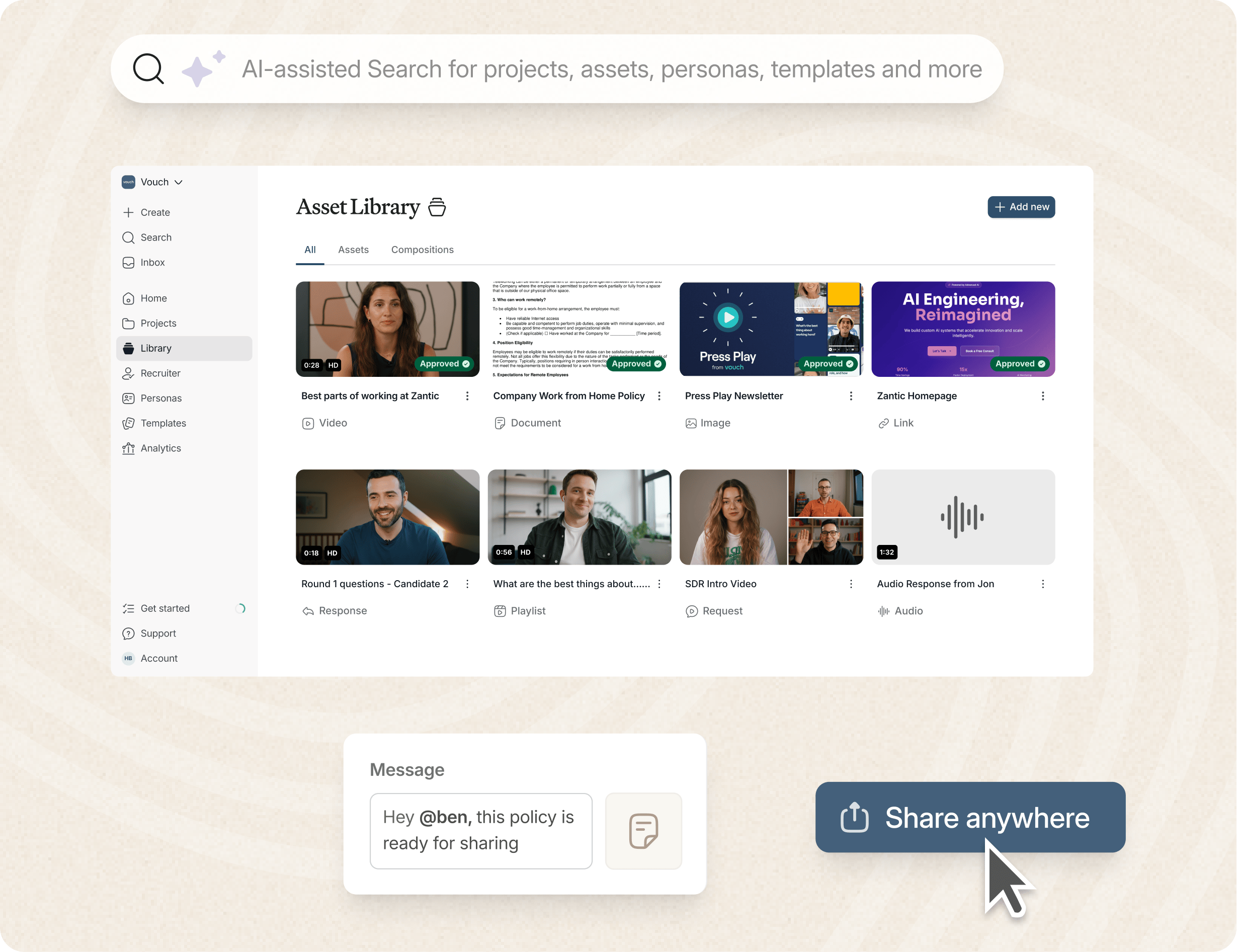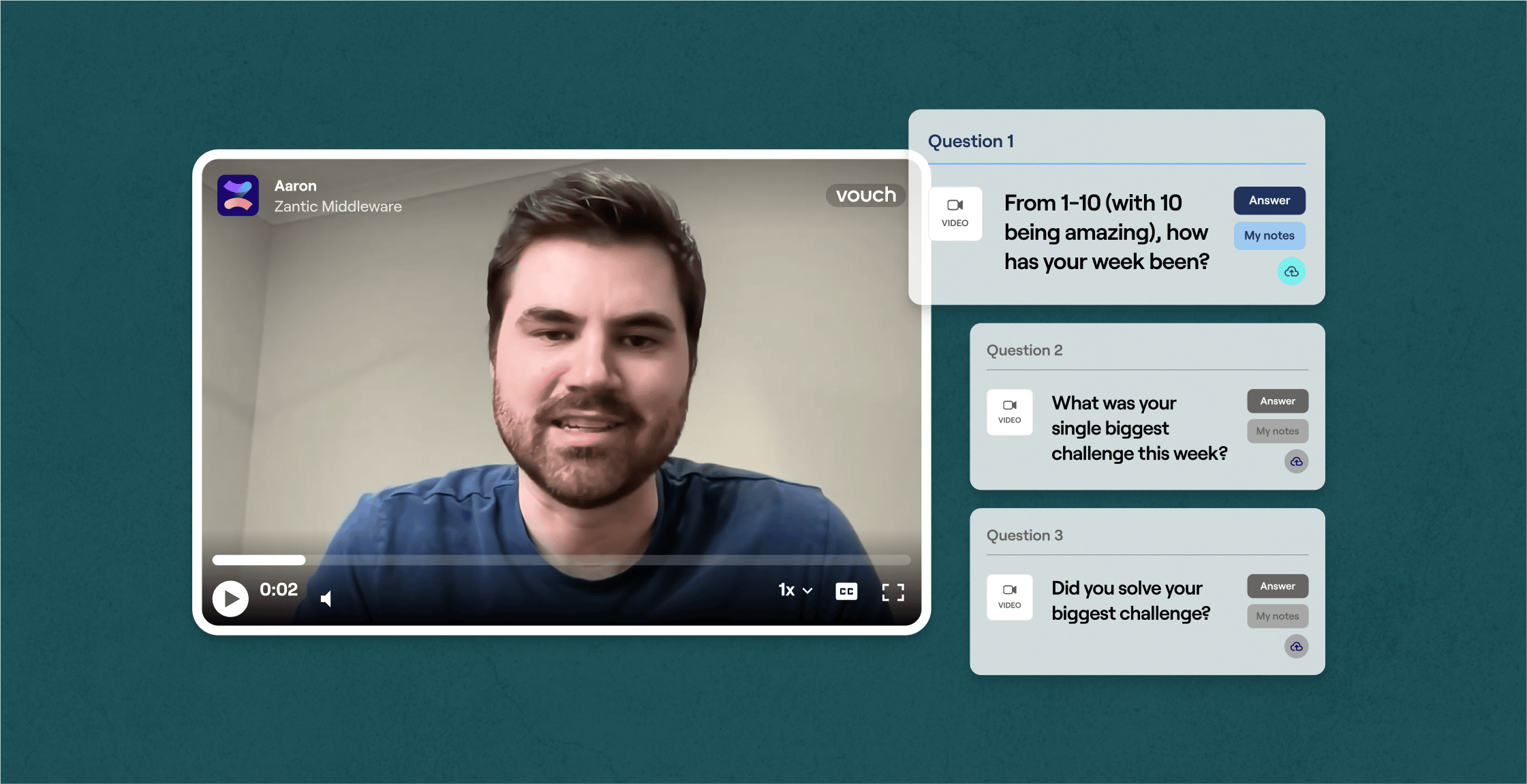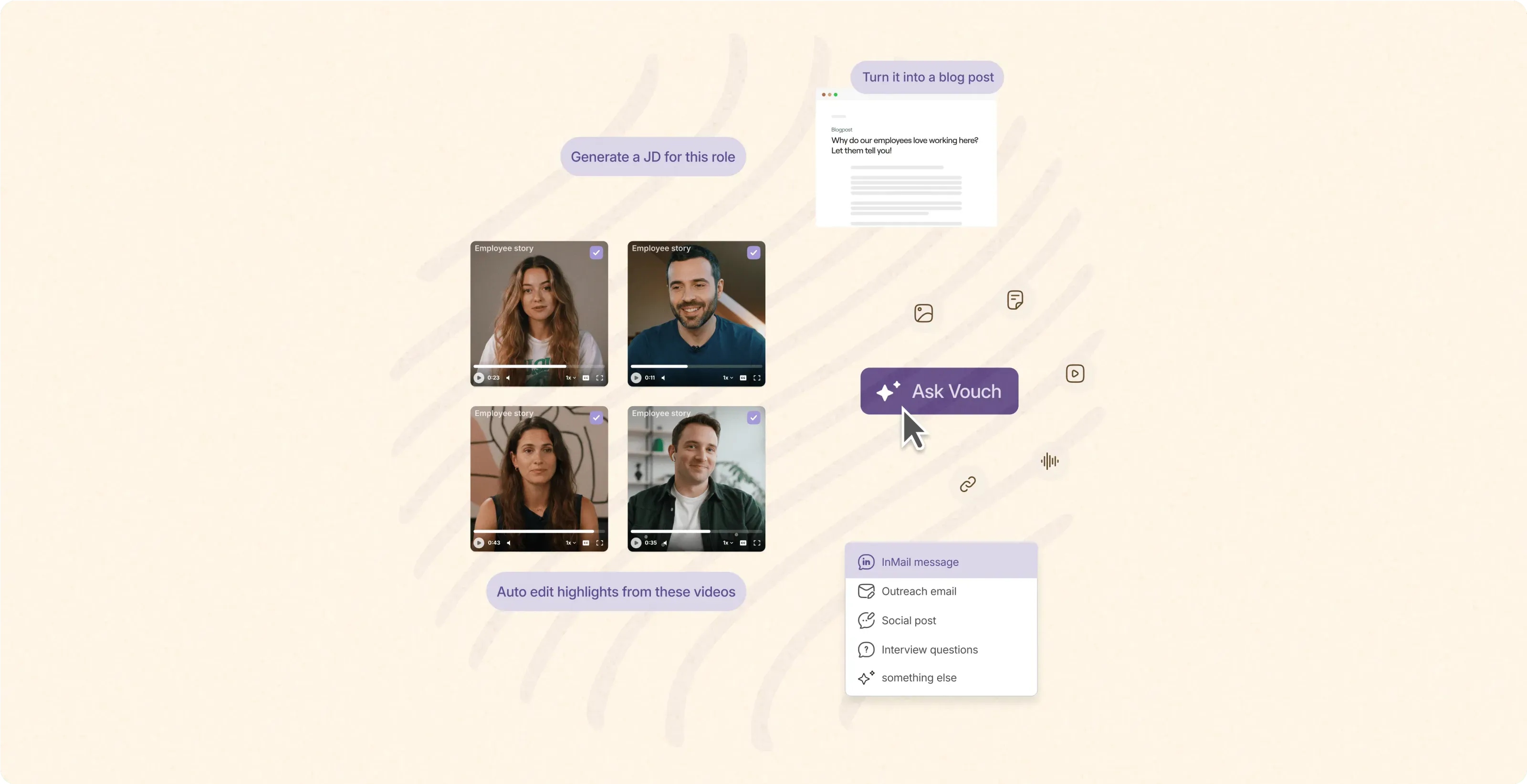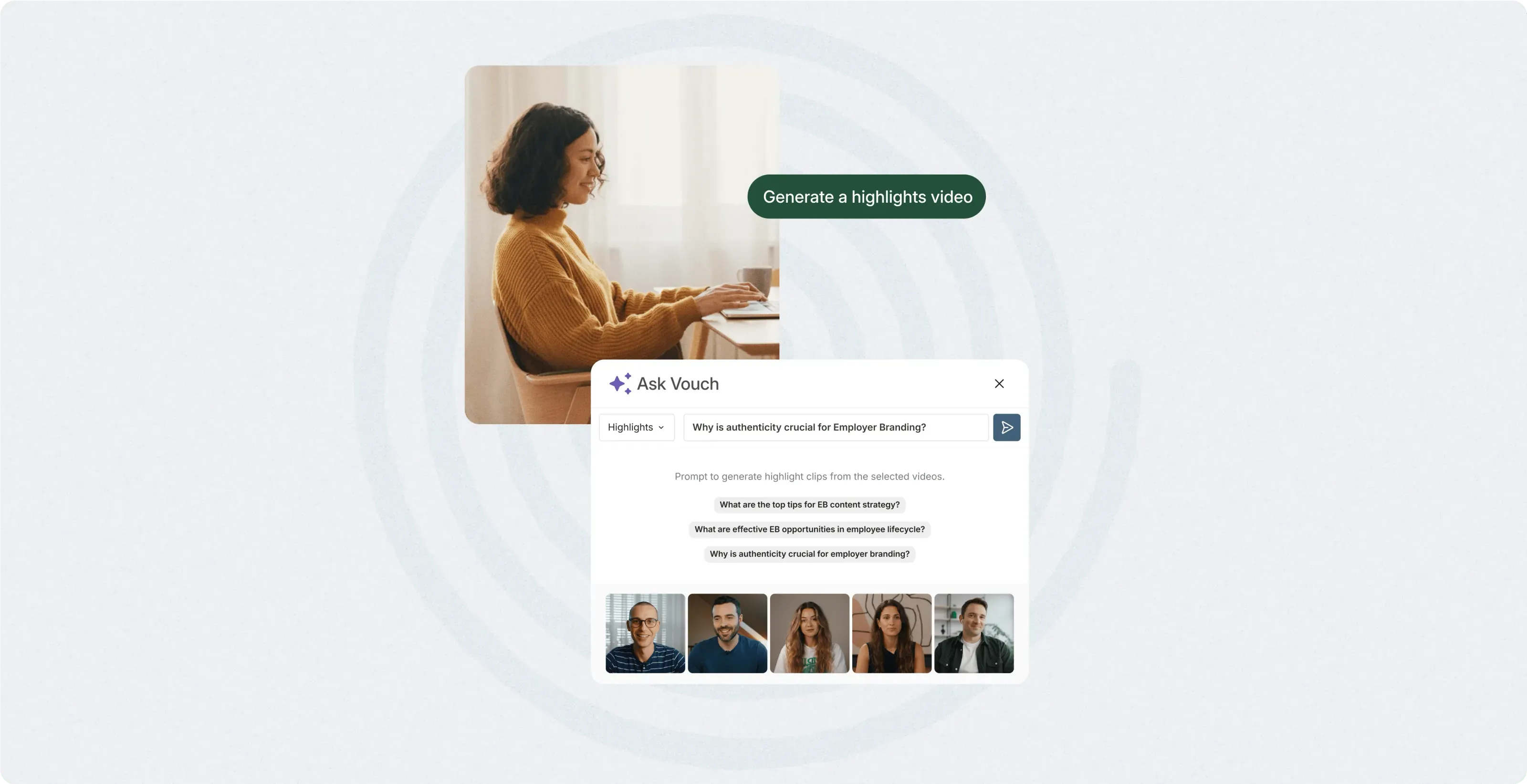If you've been researching Employer Branding (EB), you might be wondering what certain terms mean.
In this new 2026 Employer Branding glossary we outline the major Employer Branding terms, and why they matter.
Just for some context, at Vouch, our video tool is used by companies like Amazon, Canva, Cisco, HubSpot, Nike, Culture Amp and more for their Employer Branding, so we have some expertise on the subject.
Let's get started.
Why Is Employer Branding Important?
Employer branding is important for organizations as it provides a competitive advantage in the 2026 and beyond war for talent. And we mean war, top talent today have their choice of employer, and so you need to stand out, no matter what industry you are in!
Today, attracting and retaining top talent is crucial for the success of any organization, to attract candidates who align with your company's values and culture so that they love your company, and also leads to higher employee engagement and satisfaction, which in turn increases your company's growth and revenue. To learn more about why Employer Branding is so important, be sure to see our 21 Employer Brand Statistics To Know, as well as implementing best practices.
When Was Employer Branding Invented?
Employer branding, as a formal concept, can be traced back to the early 1990s. The term "employer brand" was first coined by Tim Ambler and Simon Barrow in a 1996 paper published in the Journal of Brand Management.
Their research and subsequent publication laid the groundwork for understanding how companies could use branding techniques to attract and retain employees, much like they do with customers.
However, the practice of promoting a company as a desirable place to work predates the formalization of the term. Companies have long understood the importance of reputation in attracting top talent, but it was Ambler and Barrow's work that provided a structured framework for these efforts, bringing the concept to popular HR and marketing strategies.
The AI-enabled workspace for talent teams.
- Unified workspace for talent teams
- Accelerate hiring with AI tools
- Auto-generate polished hiring and employer brand content
- Easily repurpose assets across all channel

The 2026 Employer Branding Glossary
The employer branding glossary includes a range of terms that are important for every HR Professional, Talent Acquisition and Marketing Person need to know. This employer branding glossary provides a common language and understanding of the key concepts and strategies related to your company. Here are the major Employer Branding terms used in 2026, and we'll keep adding to this glossary over time.
Employer Branding
Employer branding is the process of building, maintaining and promoting a company’s values and culture to existing and future employees. It involves creating a unique identity and reputation that attracts and retains top talent. An employer brand represents the company’s values, culture, and benefits that make it an attractive place to work. By showcasing the company's values and culture, employer branding can help attract and retain employees who align with the company's mission and vision.
It is about creating a positive perception in the minds of potential employees and setting your company apart from its competitors. Employer branding encompasses your company culture, employee experience, and employee engagement - so that you can attract and onboard top talent over your competitors, no matter how big or small your company is! This is crucial in establishing your company as a great place to work, appealing to the best-of-the-best people to see your company as the place to be.
Employer Brand Funnel
The employer brand funnel is a framework that helps your company attract and engage potential candidates throughout the talent acquisition process. It consists of various stages, starting from awareness and consideration to application and hire. At each stage, you need to create a positive candidate experience and showcase their employer brand to attract and retain top talent. The employer brand funnel involves various touchpoints, such as job advertisements, career websites, and social media platforms, that provide potential candidates with information about the organization and its culture, making it a crucial part of the hiring process.
Employee Value Proposition
In this employer branding glossary, your employee value proposition (EVP) is the unique set of benefits and rewards that employees receive in return for their contributions and performance at the workplace. It represents the value that employees gain from working for a particular organization. A strong EVP is an essential component of employer branding as it helps organizations attract and retain top talent. It includes elements such as compensation, benefits, career development opportunities, work-life balance, and company culture. By effectively communicating the EVP to potential and current employees, organizations can establish themselves as employers of choice and create a positive employer brand that attracts and retains top talent.
Employee Experience
Employee experience refers to the overall experience that employees have while working for an organization. It encompasses various factors such as the work environment, company culture, management style, career development opportunities, and work-life balance. A positive employee experience is crucial for employer branding as it affects employee engagement, satisfaction, and retention. By focusing on employee experience and continuously improving it, you can build a strong employer brand that sets them apart from their competitors and attracts the best candidates.
Employee Engagement
Your employee engagement refers to the emotional commitment and sense of pride that employees have towards their work and the organization they work for. It is a measure of how connected and motivated employees are in their roles. Employee engagement is a crucial aspect of employer branding as it directly impacts productivity, job satisfaction, and retention. By focusing on employee engagement and creating a culture that encourages employee involvement and recognition, organizations can build a strong employer brand and attract and retain top talent.
Company Culture
Company culture refers to the shared values, beliefs, and attitudes that guide the behavior of employees within your organization. It is the glue that holds the organization together and shapes its identity. A positive company culture is essential for employer branding as it attracts and retains top talent. By building a positive company culture that aligns with the organization's values and goals, you can create a strong employer brand that sets them apart from their competitors and attracts the best candidates.
Employee Persona
Employee personas or candidate personas refer to the ideal characteristics, skills, and traits of your ideal employees that you want to attract and hire. It involves creating a detailed profile of the ideal candidate based on factors such as education, experience, skills, and cultural fit. By creating an employee persona, you can align your employer brand with the values and aspirations of your ideal dandidates, leading to increased attraction and retention of top talent.
Diversity and Inclusion
Your diversity and inclusion are crucial components of employer branding as they contribute to a positive employer brand and overall reputation. When you prioritize diversity and inclusion where all employees feel valued, respected, and included, you can improve your company's overall creativity, and problem-solving capabilities.
Employer Brand Content
Employer brand content refers to the various forms of content (like Video) that your company creates and shares to promote your employer brand. It includes social media posts across Facebook, Instagram, LinkedIn, Twitter and more, along with blog articles, employee testimonials, and more. Effective employer branding content showcases your company culture, values, and employee experiences. It helps potential candidates understand what it's like to work for your organization. Here are some examples of employer brand content:
- Engaging social media posts using video that highlight your company culture and your employee's achievements
- Informative blog articles that provide insights into your organization's industry expertise and authority
- Authentic employee testimonials that showcase the employee experience and career growth opportunities
- Compelling behind the scenes videos that provide a glimpse into your company's workplace and employee benefits
Employee Spotlight Videos
In this Employer Branding Glossary we cover a lot of terms, and employee spotlight videos are one of the most important factors when it comes to employer branding, espoecially your internal employer brand. These videos show current employees sharing their work experiences - and are usually far more effective than your management team making employer branding videos. Here are 25 Brilliant Spotlight Questions for Employees that you can use today!
Employee Testimonial Video
Like Employe Spotlight Videos, Employee Testimonial Videos are a powerful tool in showcasing authentic employee experiences within a company. By sharing satisfied employees' experiences through videos, you can attract talented individuals who love your company's values and beliefs. You can also use these video on career pages, social media and recruitment ads, in fact you can use these videos at all stages of the employer branding recruitment funnel.
By providing genuine insights into the day-to-day life at the company, these videos can greatly influence potential candidates and help in building a positive employer brand, as video is ideal for creating a strong emotional connection with your ideal candidates.
Applicant Tracking System
An applicant tool (ATS) helps recruiters and managers with hiring. It organizes job posts, resumes, and candidate communication. Using an ATS can enhance your employer reputation and attracts top talent and by using ATS data, companies make better hiring decisions and improve their recruitment strategies.
Employer Brand Marketing
Employer brand marketing is a major part of your Employer Branding Glossary, and it enhances a company's reputation as an employer to attract the right talent effectively. By understanding the target audience and showcasing the company's culture and growth opportunities through methods like social media and online content, companies can stand out from competitors. Consistent promotion of their employer brand helps create a positive image and attract like-minded candidates within the organisation. This responsibility falls on the entire organisation, whether it be HR, Marketing, or General Management, to ensure a successful employer branding strategy.
Employer Branding On Social Media
Employer branding on social media is essential for modern recruitment strategies. Platforms like LinkedIn, Facebook, Instagram, and Twitter provide a unique opportunity to showcase company culture, values, and employee experiences to a broad audience.
By engaging with candidates on social media, companies can build a positive employer brand and attract top talent. Sharing employee stories, job openings, and company news helps create a strong online presence and establishes the company as an employer of choice.
Social media facilitates interactive communication, fostering a sense of community with potential applicants. This approach increases brand visibility, attracts a wider pool of candidates, and reinforces the company's reputation as an employer that values its workforce and promotes a positive work environment.
Employer Branding Recruitment
Employer branding recruitment is about attracting top talent by showcasing a positive brand. It goes beyond job postings, using strategies like employee referrals and networking events to align with company values and culture.
This approach helps companies attract long-term, high-quality candidates, building a positive reputation and competitive advantage in the talent market. Clear communication of the employer value proposition and consistent branding are key to success in employer branding recruitment.
Employer Branding Technology
In this Employer Branding Glossary there are tools, technologies and platforms that enhance a company's employer branding efforts. If you are looking for more information on Employer Branding Technology, and which tools to try out, you'll love this guide: 7 Best Tools for Employer Branding in 2026. This list also includes tools to measure employer branding effectiveness, technology to streamline your recruitment processes, and technology to incorporate employer branding into the hiring process, attracting top talent and aligning candidates with the company's values and culture.
Employer Branding And HR
Employer branding and HR are intertwined. HR shapes and promotes the employer brand internally and externally, helps create a positive work environment, drive engagement, and aligns values with your company brand. In order to build a strong employer brand, HR must also prioritize transparency and trust within the company culture. This not only improves brand reputation, but also increases employee engagement and retention. In some larger or scale up companies, there may also be a Talent Acquisition specialist who focuses on marketing and creating a positive candidate experience.
Authentic Employer Branding
Authenticity and transparency are key components of employer branding, as they involve showcasing the organization's true identity and values to resonate with potential candidates. It goes beyond marketing, focusing on trust and credibility. Aligning with culture, values, and employee experiences is crucial for creating an authentic employer brand. This involves involving employees and their stories to attract talent that aligns with company values.
Employer Branding Agency
An employer branding agency is an agency that helps firms with their branding strategies. They work on research, all the way to content creation. The agencies aid in understanding your internal company culture, market research, and branding campaigns.
Employer Brand Jobs
In this Employer Branding Glossary we cover quite a few job descriptions, and the professionals in these roles develop strategies, create content, manage social media, and engage employees to attract talent and enhance the company's reputation. These roles include manager, strategist, specialist, and coordinator who collaborate with HR, marketing, and leadership to strengthen your employer brand.
Employer Brand vs Corporate Brand
Employer brand and company brand are different but connected. The business brand shows the company's overall image, while the employer brand focuses on its reputation as company and its impact on the organization's brand image. When these brands align, they create a genuine image that appeals to customers and top talent equally. A strong employer brand can have a positive impact on the organization's brand image, resonating with customers, partners, and stakeholders. If you are looking for more information, please see this article: Employer Brand vs Corporate Brand: Key Insights
Recruitment Advertising
Recruitment advertising promotes job openings and attracts potential candidates through various channels, showcasing your employer's value proposition (EVP) and attracting top talent. It includes job postings on boards, social media ads, career fairs, and print media. Strategic recruitment advertising helps companies stand out, attract quality candidates, and build a strong employer brand.
Talent Acquisition
Finding talent is crucial for companies to attract the best people. It involves planning, marketing, and selecting candidates aligned with company values. Building relationships with potential hires is essential for creating a positive image and attracting top talent through all terms in this Employer Branding Glossary.
Content Personalization
Content personalization, like through authentic Videos, tailors recruitment content to individual candidates, enhancing their experience and attracting top talent. Content It showcases the employer brand uniquely, resonating with each candidate's preferences. Content personalization leverages data too, to create personalized content that speaks directly to candidate interests, improving recruitment outcomes and strengthening your employer brand.
Talent Pipeline
A talent pipeline is crucial for organizations to have a pool of potential candidates for current and future job openings. By proactively engaging with potential employees through strategies like social media recruitment marketing, networking events and partnerships, employers can reduce time-to-fill positions and improve retention rates.
Employer Branding Metrics
Employer branding measures show how well an employer branding plan works, and cover most terms and practices in this Employer Branding Glossary. These measures help understand how employer branding affects goals like keeping employees, engaging them, and hiring new talent. Some common employer branding measures are:
- Employee retention: Shows the percentage of employees staying.
- Employee satisfaction: Measures how happy employees are with their job.
- Employee engagement: Gauges how committed staff are to the company.
- Time-to-fill: Shows the time needed to fill a job.
- Candidate experience: Measures candidates' satisfaction during hiring.
Employer Branding Glossary FAQs.
What does employer branding consist of?
Employer branding consists of promoting a company as an employer of choice by showcasing its employee value proposition, company culture, social media presence, and recruitment practices. It aims to attract and retain top talent by creating a positive and compelling image of the organization.
What makes for good Employer Branding?
Good employer branding involves having a strong employer brand that sets the organization apart from its competitors. It provides a competitive advantage, attracts top talent, positions the company as an employer of choice, and cultivates a positive company culture that aligns with the values and aspirations of potential employees. Please see this entire Employer Branding Glossary for more information.
Why is employer branding important?
Employer branding is important because it helps organizations attract and retain top talent, gain a competitive advantage, and create a positive work environment. A strong employer brand enhances the company's reputation, increases employee engagement, and contributes to long-term business success.
What is employer branding in HR?
Employer branding in HR refers to the strategies and activities aimed at creating a positive employer brand. It involves developing an employee value proposition, promoting the company's culture, implementing effective recruitment practices, and fostering employee engagement to attract and retain top talent. Please see this entire Employer Branding Glossary for more information.
What is employer branding terminology?
Employer branding terminology refers to the specific terms and expressions used in the field of employer branding. It includes terms like employer brand, employee value proposition, company culture, social media, and recruitment, which are essential for HR professionals to understand and apply in their employer branding strategies.
What should be included in employer branding?
Employer branding should include elements such as a compelling employee value proposition, a positive company culture, a strong social media presence, and effective recruitment practices. It should showcase the organization's unique identity and provide a clear value proposition to potential employees. Please see this entire Employer Branding Glossary for more information.
What are the 5 dimensions of employer branding?
The five dimensions of employer branding include competitive advantage, employee engagement, employer brand, employee experience, and employer value proposition. These dimensions collectively contribute to creating a strong employer brand that attracts and retains top talent.
How can small businesses build an employer brand on a budget?
Small businesses can build an employer brand on a budget by focusing on their unique strengths and values, leveraging social media platforms, showcasing employee testimonials, and creating a positive work environment. They can also collaborate with local universities and community organizations to attract top talent.
What is the best employer branding campaign you know?
The best employer branding campaigns are those that effectively communicate the organization's values, culture, and employee experience. They often incorporate storytelling, employee testimonials, and creative visuals to engage and attract top talent. Each campaign is unique and tailored to the organization's specific goals and target audience.
What does stability mean in employer branding?
Stability in employer branding refers to the perceived security and sustainability offered by an organization. It signifies a positive employer brand that attracts and retains employees by providing a reliable and supportive work environment. Stability is an essential aspect of employer branding, as it contributes to employee satisfaction and retention. Please see this entire Employer Branding Glossary for more information.
Like to try Vouch To Improve Your Employer Branding?
Loved by companies like Canva, Nike, Cisco, HubSpot, Amazon, and more, tools like Vouch make leveraging video in your business remarkably easy.
Be sure to book a Vouch demo today to chat with an Employer Branding content expert.
You might also like

Elevate Your Brand Today With Vouch
Discover how Vouch can accelerate talent acquisition while helping you stay on-brand.






